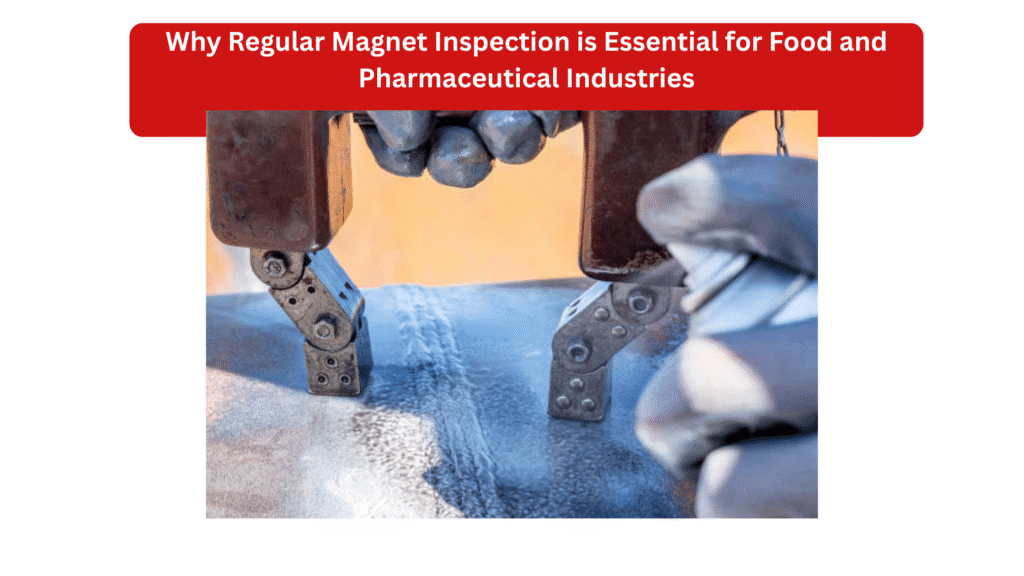In industries like food processing and pharmaceuticals, product purity and safety are non-negotiable. Even the smallest trace of metal contamination can lead to product recalls, equipment damage, or serious harm to consumers. To prevent such risks, magnetic separation systems are widely used to remove ferrous contaminants from raw materials and finished products.
However, installing magnets is only the first step. To ensure consistent performance and safety, regular magnet inspection is just as important. This process ensures that magnetic separators continue to function effectively, helping industries comply with strict quality and safety standards.
In this article, we’ll discuss why magnet inspection is critical, how it works, what standards apply, and how companies like Permag Products help maintain optimal magnetic performance in food and pharmaceutical manufacturing.
Understanding Magnet Inspection
Magnet inspection is a systematic process of checking the magnetic strength, physical condition, and overall effectiveness of magnets installed in processing lines.
The goal is to ensure that:
- The magnets are operating at their rated strength.
- There is no physical damage, corrosion, or wear.
- The magnet housing, seals, and welds are intact.
- The magnet is properly positioned in the production line.
Regular inspection helps confirm that the magnetic separator can still capture even the smallest metal fragments, such as stainless-steel dust, rust, or fine iron particles, before they contaminate products.
Why Magnet Inspection Matters
1. Product Safety and Consumer Protection
Food and pharmaceutical products must be free from any form of contamination. Metal fragments, no matter how tiny, can cause injuries, damage machinery, and ruin brand reputation.
Regular magnet inspections ensure that separators capture contaminants effectively, keeping the production line safe and compliant with food safety standards such as HACCP, FSMA, and ISO 22000.
2. Regulatory Compliance
Global regulations and auditing bodies require companies to prove that their magnets are inspected and maintained at regular intervals.
For instance:
- The BRC (British Retail Consortium) Global Standard for Food Safety mandates documented magnet checks.
- The FDA and FSSAI emphasize contamination control in food and drug production.
Without regular inspection records, a company may fail audits or face product recalls — both of which can be financially and reputationally damaging.
3. Maintaining Magnetic Strength
Over time, magnets can lose part of their magnetic strength due to various factors such as:
- Excessive heat or vibration
- Physical damage or corrosion
- Exposure to strong electrical currents
- Mechanical impact during cleaning or maintenance
Routine inspection helps detect these issues early. Measuring the Gauss value (magnetic strength) allows you to compare the current performance with the original rating and take timely corrective action.
4. Preventing Equipment Damage
Metal contamination can also harm downstream equipment such as grinders, mixers, fillers, or packaging machines.
If a magnet loses efficiency, these metallic particles can pass through and cause:
- Blade or screw damage
- Equipment downtime
- Increased maintenance costs
Regular magnet inspection ensures that your production line remains safe, smooth, and cost-efficient.
5. Consistency in Product Quality
Whether it’s powdered spices, dairy products, capsules, or tablets — even a minor inconsistency in magnetic separation can affect the final product’s purity.
Routine inspection helps maintain consistent magnetic performance, leading to uniform product quality and greater customer trust.
Magnet Inspection in the Food Industry
The food industry relies heavily on magnets to ensure contamination-free products. Typical areas where magnets are installed include:
- Ingredient receiving stations
- Mixing and blending areas
- Milling or grinding machines
- Filling and packaging lines
Common Types of Magnets Used:
- Grate Magnets: Installed in hoppers or chutes to capture fine ferrous particles.
- Plate Magnets: Used on conveyors or in chutes for bulk materials.
- Drum Magnets: Ideal for high-volume or continuous flow systems.
- Liquid Line Magnets: Designed for viscous food products such as sauces or syrups.
Frequency of Inspection:
Food industry best practices recommend quarterly or bi-annual magnet inspections, depending on product type, production volume, and contamination risk.
Magnet Inspection in the Pharmaceutical Industry
In the pharmaceutical sector, magnet inspection is even more critical due to the strict safety and purity requirements for medicines.
Magnets are typically used:
- In powder processing and granulation
- Before tablet compression
- During capsule filling and packaging
These magnets prevent metallic particles from entering products that will be consumed or injected, ensuring compliance with Good Manufacturing Practices (GMP) and WHO guidelines.
Why Frequent Inspection is Crucial:
Pharmaceutical manufacturing environments often involve fine powders and high-speed machinery. Even a slight drop in magnet efficiency can allow contaminants that are invisible to the naked eye.
Regular magnet testing and documentation not only protect patients but also safeguard the manufacturer from costly regulatory penalties.
What a Professional Magnet Inspection Involves
A comprehensive magnet inspection involves several key steps:
- Visual Examination:
Inspect for wear, cracks, corrosion, or coating damage on the magnet surface. - Magnetic Strength Measurement:
Using a Gauss meter, technicians measure the magnetic field strength at key points. These readings are compared to the magnet’s original rating. - Functional Testing:
Verification that the magnet is correctly positioned and effectively removing ferrous material. - Cleaning and Reinstallation:
Cleaning magnets properly helps maintain performance and hygiene. After inspection, magnets are reinstalled securely. - Documentation and Reporting:
A detailed inspection report is provided, showing test results, Gauss values, condition notes, and recommended maintenance actions.
At Permag Products, our trained engineers perform comprehensive magnet inspections that comply with global standards and help clients maintain continuous operational integrity.
How Often Should You Schedule Magnet Inspections?
The inspection frequency depends on:
- Type of product: High-risk products (like baby food or pharmaceuticals) require more frequent checks.
- Production volume: Heavier use means faster wear.
- Environment: Moist or abrasive environments may degrade magnet coatings faster.
- Regulatory requirements: Certain certifications require documented quarterly or annual inspections.
As a general rule:
- Food industry: Every 3–6 months
- Pharmaceutical industry: Every 2–4 months
Benefits of Partnering with Experts Like Permag Products
At Permag Products, we understand that magnet inspection is not just about compliance — it’s about protecting your brand and customers. Our inspection and validation services include:
- On-site testing and performance verification
- Gauss measurement and certification
- Preventive maintenance recommendations
- Detailed inspection reports for audit compliance
Our magnets are designed for long-term durability, corrosion resistance, and maximum magnetic strength, ensuring reliable contamination control in the most demanding environments.
Conclusion
Regular magnet inspection is an essential part of any quality assurance and safety program in the food and pharmaceutical industries. It helps prevent contamination, ensures compliance with international standards, maintains production efficiency, and protects brand reputation.
By scheduling timely inspections and working with experts like Permag Products, manufacturers can achieve complete peace of mind, knowing their magnetic systems are performing at their best.
In industries where purity means safety, magnet inspection isn’t optional, it’s essential.
About Permag Products
Permag Products is a leading manufacturer of high-performance magnetic separators and inspection systems, trusted by food, pharmaceutical, and process industries across India and abroad. With decades of experience, we help companies achieve excellence in contamination control, product safety, and process efficiency.

